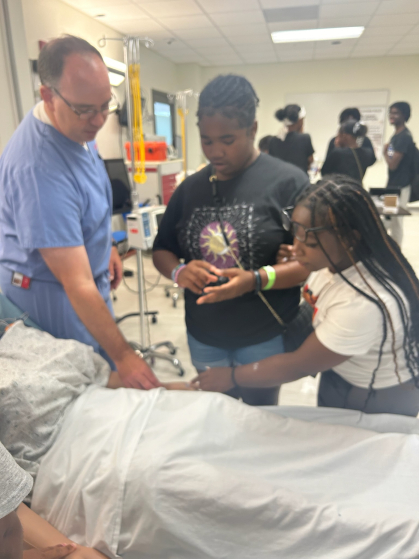How Rutgers Health and Vaccine Equity Education Coalition Ambassadors at the Boys & Girls Club of Newark Are Promoting Vaccine Equity

Ernest Mario School of Pharmacy trains Vaccine Equity Education Coalition Ambassadors at the Boys and Girls Club of Newark to be advocates who counter vaccine hesitancy and build trust in immunization in their communities
Flu vaccination coverage has been consistently lower among Black Americans since 2010, with 43 percent of Black adults receiving the vaccine versus 51 percent of White adults in the 2022–23 season, according to the Centers for Disease Control and Prevention.

To combat misinformation leading to vaccine hesitancy, seven Vaccine Equity Education Coalition (VEEC) Ambassadors, all of whom are high school members of the Boys & Girls Club of Newark, visited the Rutgers Ernest Mario School of Pharmacy on August 9 to explore ideas to enhance vaccine equity and build community trust in preventative medicine. This partnership, in collaboration with Rutgers Health and the Vaccine Equity Education Coalition, exemplifies a commitment to promoting health equity and providing educational resources to those who need them most.
During the visit, faculty, students and staff from the pharmacy school engaged with VEEC ambassadors, who ranged from sophomores to seniors in high school, and discussed the importance of vaccines and the role they play in maintaining public health in partnership with local pharmacists.
The event featured an educational session and a simulation scenario in the Mannino Community Pharmacy simulation laboratory, where the members practiced one-on-one vaccine counseling scenarios. These exercises helped them address common misconceptions, barriers and vaccine hesitancy in their communities. Topics included vaccine effectiveness, mistrust of information, the role of social media in spreading misinformation and barriers like the inability to pay for vaccines. This experience was the culmination of a six-week summer experience for VEEC Ambassadors aimed at increasing youth-driven knowledge and awareness of vaccine equity.
“Building trust in vaccines starts with education and community engagement,” said Les Barta, director of simulation at Ernest Mario School of Pharmacy. “By partnering with organizations like VEEC and the Boys & Girls Club, we can reach a broader audience and foster a culture of health and prevention right in their communities as change agents.”
Held during National Immunization Awareness Month, the event allowed VEEC Ambassador at the Boys and Girls Club of Newark to learn how to best communicate with family and friends using authentic communication — the alignment between one’s internal experience and the external words and actions — to build trust and share their own experiences with vaccines. This dialogue emphasized the importance of listening to community voices and tailoring public health strategies to meet their needs.
“Our collaboration with Rutgers Health and the Boys & Girls Club of Newark represents a critical step in empowering youth to become advocates for their communities,” said Haj Shirley, at the Vaccine Equity Education Coalition. “As the coalition was spearheaded with support from a Rutgers-IDEA grant, VEEC is dedicated to addressing vaccine hesitancy, promoting equity and engaging our beloved RU community along the way. This partnership is about giving voice to those who are often underrepresented in the public health conversations.”
“Our goal is to equip these young leaders with the knowledge and skills they need to advocate for vaccine equity in their communities,” said Nina Raps, pharmacy field manager at the Ernest Mario School of Pharmacy. “By partnering with VEEC and the Boys & Girls Club of Newark, we are fostering a new generation of informed and proactive health ambassadors. This collaboration marks a significant step toward achieving vaccine equity, ensuring that all communities have access to life-saving immunizations.”


